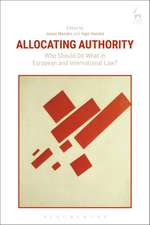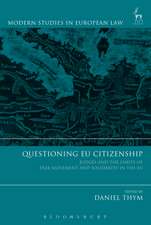The European Banking Union and Constitution: Beacon for Advanced Integration or Death-Knell for Democracy?
Editat de Professor Dr Stefan Grundmann, Hans W. Micklitzen Limba Engleză Hardback – 23 ian 2019
| Toate formatele și edițiile | Preț | Express |
|---|---|---|
| Paperback (1) | 300.42 lei 6-8 săpt. | |
| Bloomsbury Publishing – 30 sep 2020 | 300.42 lei 6-8 săpt. | |
| Hardback (1) | 571.66 lei 6-8 săpt. | +123.84 lei 4-10 zile |
| Bloomsbury Publishing – 23 ian 2019 | 571.66 lei 6-8 săpt. | +123.84 lei 4-10 zile |
Preț: 571.66 lei
Preț vechi: 817.61 lei
-30% Nou
Puncte Express: 857
Preț estimativ în valută:
109.39€ • 114.50$ • 91.04£
109.39€ • 114.50$ • 91.04£
Carte tipărită la comandă
Livrare economică 31 martie-14 aprilie
Livrare express 21-27 februarie pentru 133.83 lei
Preluare comenzi: 021 569.72.76
Specificații
ISBN-13: 9781509907540
ISBN-10: 1509907548
Pagini: 336
Dimensiuni: 156 x 234 x 28 mm
Greutate: 0.66 kg
Editura: Bloomsbury Publishing
Colecția Hart Publishing
Locul publicării:London, United Kingdom
ISBN-10: 1509907548
Pagini: 336
Dimensiuni: 156 x 234 x 28 mm
Greutate: 0.66 kg
Editura: Bloomsbury Publishing
Colecția Hart Publishing
Locul publicării:London, United Kingdom
Caracteristici
This book is a timely assessment of the European Banking from the legal, economic and political perspective
Notă biografică
Stefan Grundmann is Professor of Transnational Private Law and Theory at the European University Institute, Florence.Hans-W Micklitz is Professor of Economic Law at the European University Institute, Florence.
Cuprins
1. The European Banking Union and Constitution - The Overall Challenge Stefan Grundmann and Hans-W Micklitz PART ISOME CONSTITUTIONAL FOUNDATIONS OF EUROPEAN BANKING UNION2. The Constitutional Dimension of Banking Union Takis Tridimas3. The Thin Red Line Between the OMT Decision and the Banking UnionAlessandro Busca PART IIEUROPEAN BANKING UNION AND FULL INTEGRATION4. The European Banking Union and Integration Stefan Grundmann5. Banking Union and the European Economic Constitution: A Brief Comparison of Regulatory Styles in Banking Regulation and Competition Law Heike Schweitzer6. Technocratic and Centralised Decision-making in the Banking Union's Single Supervisory Mechanism: Can Single Market and Banking Union Governance Eff ectively Co-exist in a Post-Brexit World? Niamh Moloney7. Single Resolution Board: Lost and Found in the Thicket of EU Bank Regulation Agnieszka Smolenska PART IIIEUROPEAN BANKING UNION, DEMOCRACY AND TECHNOCRACY8. Some Reflections on the State of European Democracy with Regard to the Banking Union and the ECB Christoph Möllers9. The European Banking Union: A Case of Tempered Supranationalism? Sergio Fabbrini and Mattia Guidi10. Prudential Supervision and the European Central Bank Credit Data Registry (AnaCredit): Legal Basis and Democratic Accountability Federico Ferretti11. The Internal Market and the Banking Union Hans-W. Micklitz12. Should Non-participating Member States Join the Banking Union? A Legal Perspective Dalvinder Singh
Recenzii
Both academic scholars and practitioners dealing with legal questions in the area of European integration and financial regulation can learn much from the informed contributions on this work. Furthermore, anyone interested in the state of democracy in Europe will find new information and inspiration in this volume.
The issues examined in the book ... are addressed in an interesting way. Readers can find a lot of information and multiple analyses, legal and economic, political and technical ... Clearly, the authors give us food for thought. It is the reason why the book must be read.
This book will undoubtedly be of interest to any scholar interested in understanding how the EBU functions, and most importantly how it is embedded within the EU's constitutional framework.
The issues examined in the book ... are addressed in an interesting way. Readers can find a lot of information and multiple analyses, legal and economic, political and technical ... Clearly, the authors give us food for thought. It is the reason why the book must be read.
This book will undoubtedly be of interest to any scholar interested in understanding how the EBU functions, and most importantly how it is embedded within the EU's constitutional framework.






















